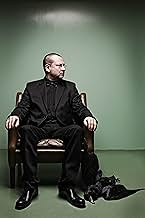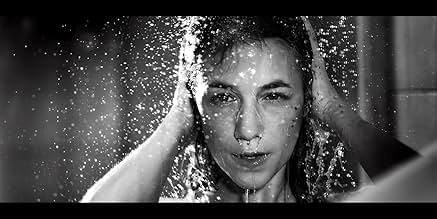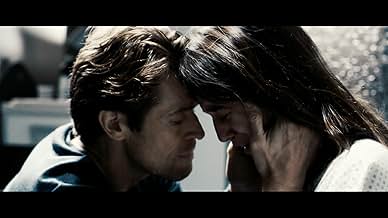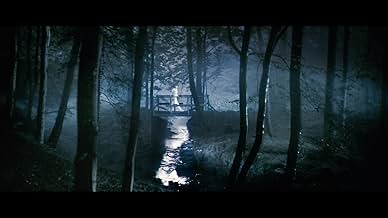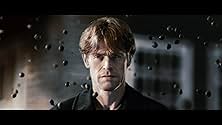Una coppia che ha perso un figlio si ritira in una baita isolata nei boschi per tentare di salvare il proprio matrimonio, con esiti nefasti.Una coppia che ha perso un figlio si ritira in una baita isolata nei boschi per tentare di salvare il proprio matrimonio, con esiti nefasti.Una coppia che ha perso un figlio si ritira in una baita isolata nei boschi per tentare di salvare il proprio matrimonio, con esiti nefasti.
- Regia
- Sceneggiatura
- Star
- Regia
- Sceneggiatura
- Star
- Premi
- 21 vittorie e 33 candidature
Trama
Lo sapevi?
- QuizThe Sound Engineer actually swallowed a microphone and recorded the inner audio of his body in order to achieve certain similar sounds for the film.
- BlooperIn the end titles, George Frideric Handel's piece "Lascia ch'io pianga" is wrongly listed as "Laschia ch'io pianga".
- Citazioni
Fox: Chaos reigns.
- ConnessioniFeatured in At the Movies: Cannes Film Festival 2009 (2009)
- Colonne sonore'Lascia ch'io pianga' from 'Rinaldo'
Composed by George Frideric Handel (as Georg Friedrich Händel)
Performed by Tuva Semmingsen and Barokksolistene
Recensione in evidenza
This movie drained me...
Without a doubt the most unpleasant and despairing movie I've ever watched. It's not just the graphic imagery that got to me, but the overall tone of the movie was incredibly dreadful and you could almost feel a presence of some sort of "evil".
This is a hard movie to review. It crosses all barriers when it comes to movie making...ALL. It makes you question yourself about what art is and if there's anything as going "too far"?
But don't dismiss this. It's certainly much more than just being graphic for the sake of it. First off, the cinematography is absolutely flawless. The opening scene had me in absolute awe. Beautiful... And my deepest respect to Willem Dafoe and Charlotte Gainsburg. I could only imagine how much this would drain the actors both mentally and physically. They are amazing and deserve Oscars.
I have to mention the violence too, since it's a critical aspect. This isn't "torture porn" of any kind. It's natural (it's looks almost too realistic), physical sexual violence. That's why it works so effective on the audience. You can almost feel their pain. Never before have I watched a movie where I felt the urge to look away. You would think that, in the end, all this violence and self molestation is just a shock tactic, but I assure you it's not. There is actually a plot and a sensible progression of the movie. I of course won't say too much. People need to see it.
I can understand why some people wouldn't like it, and that's okay. This is most definitely not for everyone.
It may not be a movie that made me feel good, but it made feel something and had an effect on me. It's beautiful, sad, poetic, horrific and in the end, oddly uplifting. A genre masterpiece.
A must see.
10/10.
Without a doubt the most unpleasant and despairing movie I've ever watched. It's not just the graphic imagery that got to me, but the overall tone of the movie was incredibly dreadful and you could almost feel a presence of some sort of "evil".
This is a hard movie to review. It crosses all barriers when it comes to movie making...ALL. It makes you question yourself about what art is and if there's anything as going "too far"?
But don't dismiss this. It's certainly much more than just being graphic for the sake of it. First off, the cinematography is absolutely flawless. The opening scene had me in absolute awe. Beautiful... And my deepest respect to Willem Dafoe and Charlotte Gainsburg. I could only imagine how much this would drain the actors both mentally and physically. They are amazing and deserve Oscars.
I have to mention the violence too, since it's a critical aspect. This isn't "torture porn" of any kind. It's natural (it's looks almost too realistic), physical sexual violence. That's why it works so effective on the audience. You can almost feel their pain. Never before have I watched a movie where I felt the urge to look away. You would think that, in the end, all this violence and self molestation is just a shock tactic, but I assure you it's not. There is actually a plot and a sensible progression of the movie. I of course won't say too much. People need to see it.
I can understand why some people wouldn't like it, and that's okay. This is most definitely not for everyone.
It may not be a movie that made me feel good, but it made feel something and had an effect on me. It's beautiful, sad, poetic, horrific and in the end, oddly uplifting. A genre masterpiece.
A must see.
10/10.
I più visti
Accedi per valutare e creare un elenco di titoli salvati per ottenere consigli personalizzati
Dettagli
- Data di uscita
- Paesi di origine
- Lingua
- Celebre anche come
- Anticristo
- Luoghi delle riprese
- Aziende produttrici
- Vedi altri crediti dell’azienda su IMDbPro
Botteghino
- Budget
- 11.000.000 USD (previsto)
- Lordo Stati Uniti e Canada
- 404.122 USD
- Fine settimana di apertura Stati Uniti e Canada
- 71.397 USD
- 25 ott 2009
- Lordo in tutto il mondo
- 7.426.176 USD
- Tempo di esecuzione1 ora 48 minuti
- Colore
- Mix di suoni
- Proporzioni
- 2.35 : 1
Contribuisci a questa pagina
Suggerisci una modifica o aggiungi i contenuti mancanti






